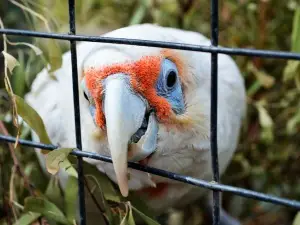
Feeling pain is a natural part of life for us humans, feeling pain has helped us evolutionarily. It is said that animals feel pain as well, but we as humans can’t really be sure.
If you as a bird owner notice that your bird is showing signs of being in pain it’s normal to want to help your bird. This article looks into pain relief options for birds
Table of Contents
Pain relief for birds:
Birds can easily become injured, birds can knock into windows, they can be hit by cars and predators can attack them.
When humans are severely injured, adrenaline is pumped through our veins, this reduces the sensation of pain.
It is assumed that if a bird is being eaten, it also gets this adrenaline rush and will thus not feel the pain of being eaten. The pain would only be felt later on if the bird does not die.
If your bird becomes injured, and is in pain, there are a few things that you can give it:
Natural options:
Valerian:
This is a natural pain reliever that is quite safe to give to birds, it is a non-narcotic herbal sedative. Valerian is one of the more reliable natural pain relievers that you can offer birds.
If you’re considering giving this pain reliever to your bird make sure that you consult with an experienced herbalist before feeding it to your bird.
Cayenne pepper:
Cayenne pepper has anti-inflammatory properties, which makes it an excellent pain reliever for birds.
To use cayenne pepper for pain relief, mix the pepper with water to create a paste. Use distilled water to create the paste. Apply this paste onto your bird to any swollen areas to help with pain making sure to avoid the bird’s eyes.
Do not use this paste on your bird’s open wounds, cuts, scratches, or scrapes.
Turmeric and ginger:
Both of these herbs have natural anti-inflammatory properties, which makes them helpful in healing pain. Feed these herbs to your bird as a way of managing their pain.
Camomile tea:
While camomile tea isn’t able to relieve your bird’s pain symptoms, it is helpful in calming the bird if it’s experiencing distress because of the pain.
Commercial options:
Aspirin:
Aspirin is not only good at helping humans deal with pain, it is also helpful to birds dealing with pain as well.
That being said, because birds have much smaller bodies than humans do, and because aspirin has been designed to work in a human-sized body, you should give the bird aspirin in minute quantities.
Note: Only give the bird aspirin if the bird has pain issues, giving the bird aspirin when the bird doesn’t need it will have a negative effect on the bird’s well-being.
Butorphanol:
If your bird has a fracture, or any other type of acute trauma, then the bird can be given this medication as a treatment. This medication is a short-acting opioid, it cannot be used on birds long-term.
Tramadol:
This medication is an opioid that can be used in humans and in birds.
The benefits of this medication are that it can be given to birds orally and it is quite long-lasting, it’s longer-lasting than butorphanol.
Meloxicam:
This medication can be given to birds who have acute pain as well as to birds who have chronic pain. If you’re wanting to give this medication to your bird, you’d need to make sure that the bird is well hydrated before serving
Warning about giving your bird pain medications:
All of the medications mentioned above may be a great way to get rid of pain in birds but these medications should not be given to your bird without first consulting with your vet.
Only a well-trained vet can prescribe pain medications at the correct dosages for your pet bird.
Because birds are small, the margin of error when it comes to medication is small.
Giving any medications to your bird, even if the medications are bird safe, at the incorrect amounts or giving them the wrong medication, can poison and even kill a bird.
What not to give the bird:
Birds have very small bodies and fast metabolisms. They are very sensitive to substances, if you feed birds something not suited for them they can be very badly affected.
There are a variety of natural and commercial painkillers that should not be given to birds:
Tea tree oil:
Tea tree oil may be recommended as a pain reliever for humans, but it is toxic to animals and is on many “toxic for birds” lists. This essential oil is very corrosive to the mucus membranes of birds and it damages the bird’s crop.
Corticosteroids:
Corticosteroids may be fine for use in humans, but these medications should not be used in birds. Corticosteroids can cause the bird to develop aspergillosis, aspergillosis is a secondary infection. Corticosteroids are also immunosuppressants to birds.
Other opioids:
Giving birds opioids other than the ones listed above is not recommended. Standard opioids, like morphine, should not be given to birds, birds have different physiological responses to these than mammals do.
If you enjoyed this article then you may also be interested in other bird related articles. Here are some articles that you may be interested in: Apple Cider Vinegar For Budgies, Natural Antibiotics For Budgies, My Bird Hit His Head, Signs Of Head Trauma In Birds,

